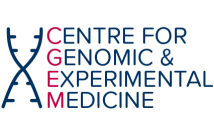Charlie Lees Research Group
Uncovering the causes of consequences of inflammatory bowel disease by studying the role of genes, the environment, diet and microbiota and their inter-relationships in gut health and disease
Section: Translational Epidemiology

Research in a Nutshell
After a decade researching the genetics of inflammatory bowel disease we have moved to additionally explore the role of the environment (especially habitual diet), and the gut microbiota. Crohn’s disease and ulcerative colitis are common and debilitating conditions affecting more than 1 in 200 young people in Scotland.
Our research programme aim sits at the translational interface between basic science and clinical research. We are exploring the role of genes, environment and the microbiota in the causes and consequences of IBD through 2 major multi-center clinical studies that are being led by Charlie Lees and run by the Edinburgh Clinical Trials Unit.
In the GEM study (www.gemproject.ca) we are recruiting 5000 young healthy first-degree relatives of patients with Crohn’s disease, performing a detailed baseline assessment, and then following subjects >3years to explore the differences in those that remain well versus those incident cases of Crohn’s disease in an unbiased manner. This is the first study of its kind that eliminates the cause and effect conundrum of studying diet and microbiota where gut inflammation is already established.
The PREdiCCt study (www.predicct.co.uk) is recruiting 1500 patients with Crohn’s disease and ulcerative colitis in clinical remission and performing a detailed baseline phenotyping, nutrition and environmental survey and biological sampling (bloods, saliva and stool). Patients are then followed via a bespoke web portal providing monthly assessments over two years to assess for disease flare. Detailed dietary analysis, whole genome sequencing and full metagenomics of the gut microbiota from baseline samples will then be analysed in patients who flare and compared with those that stay in remission throughout. This will be the first critical step in understanding what aspects of habitual diet, the broader environment and the gut microbiota predict disease flare versus prolonged remission and will pave the way for state-of-the-art interventional studies as the next phase of this exciting research programme.
PREdiCCT Research Programme (external)
People |
|
| Prof Charlie Lees | Group Leader |
| Nathan Constantine-Cooke | Post-doctoral Research Scientist |
| Chiara Cotronei | Clinical Fellow |
| Lisa Derr | Trial Manager |
| Alex Elford | Clinical Fellow |
| Beatriz Gros | Clinical Fellow |
| Gareth Jones | Clinical Lecturer |
| Debbie Kerr | CGEM Research Nurse |
| Nik Plevris | Clinical Fellow |
| Louise Taylor | CGEM Research Nurse |
Contact
Collaborations
- Dr Jeff Barrett, Sanger Institute, Cambridge
-
Dr Luke Jostins, University of Oxford
-
Dr Alex Johnstone, food scientist, Rowett Institute
- Dr Georgina Hold, microbiota scientist, University of Aberdeen
- Professor Angus Watson, NHS Highlands
- Professor Tim Card, University of Nottingham
- Dr Miles Parkes, Addenbrooke’s Hospital, Cambridge
- Dr Nick Kennedy, University of Exeter
Partners and Funders
- Edinburgh Clinical Trials Unit
- Wellcome Trust Clinical Research Facility
- Chief Scientists Office
- CORE
- Cure Crohn’s and Colitis
- 3CS
Scientific Themes
Inflammatory bowel disease, Crohn’s disease, ulcerative colitis, inflammation, diet, nutrition, genetics, microbiota, exposome


